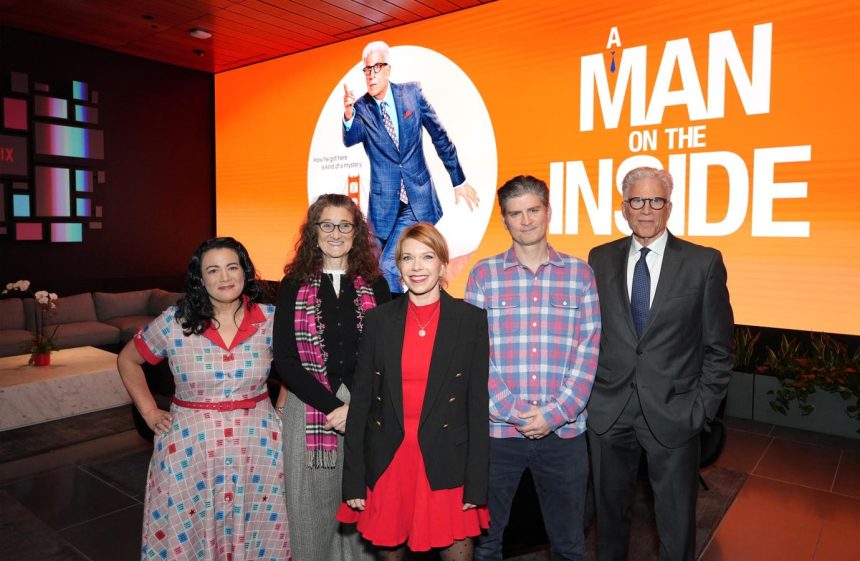My husband and I enjoy the Netflix show, “Man on the Inside,” starring Ted Danson. Danson plays Charles, a retired professor of engineering who has recently lost his wife. Since his adult daughter is worried he is depressed, lonely, and bored, she encourages him to get a job that will get him out of the house so he can be around other people.
Charles finds a job listing looking for an older person that requires technological skills, so he applies for the position and is hired. He becomes an undercover investigator in a retirement home tasked with finding the thief who stole a resident’s necklace. Charles becomes the “man on the inside” and we get to experience what it is like to live in such a place. Since the show is so popular, it has been extended to a second season.
Recently, I went to visit a friend of mine and his wife who moved to a retirement community—more like a resort. He told me how aging in place may not be the answer for everyone. We started talking about “Man on the Inside” and he said, “I can be your man on the inside. I’ll share three ideas I’ve learned since living here for about six months.”
This is what I learned from my friend–my man on the inside of his nice retirement community.
- You’re Here. Now What?
Moving to a retirement community is an adjustment. My friend and his wife now have a much smaller living space, which meant they had to decide what to do with their many nice possessions. He had to become comfortable with letting go which was not easy. The couple wanted this move to be successful because they are positive thinking people. Since the retirement community is a continuing care facility, they admit it is their last move.
It’s possible to view one’s “last move” with only sadness, but gratitude is an attitude, and they are grateful to have found their retirement community at this time in their lives. Dr. Becca Levy, a professor of epidemiology at Yale School of Public Health and a professor of psychology at Yale University, is the author of “Breaking the Age Code, How Your Age Beliefs Determine How Long and Well You Live.” Her research has revealed that health problems thought due to aging are more influenced by negative age beliefs—myths that are not necessarily true. “Positive age beliefs, on the other hand, lead to better health and even longer life – 7.5 years on average, in fact.”
My friend realizes a positive mindset about aging affects a person’s health. But it can be a challenge when surrounded by others who are not aware of this research. According to Levy, “For better or for worse, those mental images that are the product of our cultural diets, whether it’s the shows we watch, the things we read, or the jokes we laugh at, become scripts we end up acting out.” It’s normal to have mixed emotions when making “your last move,” but it’s important make the mental space for gratitude and possibility.
- Make The Effort To Get To Know People
The retirement community has multiple structured activities every day for residents. By observing and interacting with residents, my friend has been thinking about not just filling his time with activities but asking himself how to fulfill his heart and mind with meaningful activities. He asked me, “After a career of measuring success by business deals closed, patients served, students taught, children and grandchildren raised, and money earned, how do you measure success and productivity?
My friend owned a successful business and is an extroverted former salesperson. He knows that cultivating and maintaining relationships is critical to happiness. Research by Robert Waldinger, author of “The Good Life: Lessons from the World’s Longest Scientific Study of Happiness,” demonstrates that “one of the most important determinants of good health and happiness is having strong social relationships.”
My friend suggested building some activities into your life to encourage you to get out of your own apartment. Interview someone you don’t know, write a story, and share it in a group setting to introduce residents to one another at a deeper level. Draw names from a hat. Spend time together with your selection and interview the person like a reporter. Find the facts and tell the story. Have a word or time limit.
When I attend funerals, I often learn tidbits about the person I wished I had known earlier. I have often wondered why we wait to learn about people until it is too late. Participating or holding “get to know you” activities in your community makes space to learn unexpected things about each other. Another idea would be to celebrate the life of a different person each week. Develop a system for individuals to display items special to them as is done in many celebration-of-life ceremonies—but do it while the person is alive and well.
The bottom-line is to stay active, engaged, and connected. Participate in activities you enjoy, join clubs, and volunteer. Develop relationships by getting to know people.
- Find Purpose And Rewards
My friend was a driven and highly successful person, and he has wondered how to find purpose and personal rewards living in a retirement community. It is common knowledge that maintaining one’s physical health should be a priority. In fact, health is the real wealth. My friend exercises every day in the state-of-the-art equipment with personal trainers available.
Beyond physical health, my friend told me about his desire to also continue to grow intellectually, spiritually, and emotionally. He described the variety of classes and programs offered and how he and his wife take advantage of these opportunities.
This Is Your Time
My friend asked me if it was OK to just have fun in senior living. I told him, “This is your time. You earned it so enjoy it. You have the freedom and flexibility to decide how to allocate your resources of time, energy, and money.”
When it comes to purpose, I advocate thinking of it as how to continue to contribute to your family, your community at large or the retirement community. Find ways to share your knowledge and experience through mentoring or volunteering.
Chip Conley, co-founder of the Modern Elder Academy and author of “Learning to Love Mid-Life: 12 Reasons Why Life Gets Better with Age,” likes to ask the question: Five years from now, what will I regret if I don’t learn it or do it now? Conley believes mid-life is an extended gift of possibility, growth, and self-discovery. He defines mid-life from early adulthood to late adulthood—approximately from age 35 to 74.
My friend, my man on the inside, and I concluded it is important to be happy with yourself. I’ve always liked the book by on mindfulness by Jon Kabat-Zinn and especially the title: “Wherever You Go, There You Are.” It doesn’t matter where you live or with whom you live if you are not happy within yourself. Make time for solitude and silence to hear how you are feeling and what you are thinking. Find joy in the gift of time. And remember to breathe.
Read the full article here




